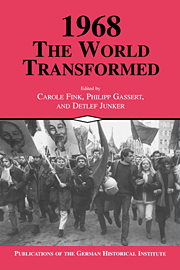Introduction
Published online by Cambridge University Press: 05 January 2013
Summary
Nineteen sixty-eight, the year of global crisis halfway between the end of World War II and the end of the Cold War, has yet to establish a solid position in contemporary history - either in the recollections of the participants or in the interpretations of two generations of scholars. The memories of witnesses to the events of this annus mirabilis are still fragmentary and colored by partisanship, personal injury and defeat, or nostalgia for a heroic time, whereas historians have barely begun to treat “1968” as a coherent historical phenomenon.
The events of 1968 happened within national contexts yet took place across the globe - from Berkeley to Berlin, Bangkok to Buenos Aires, Cairo to Cape Town, Paris to Tokyo. In addition, many contemporaries - particularly students and intellectuals - believed that their actions were linked to a global revolt against capitalism, imperialism, and colonialism that spanned the First, Second, and Third Worlds. People everywhere recognized and responded to photographs, films, tales, and written accounts that spread around the world by word of mouth, in newspapers, or over radio and television, depicting wars and civil wars, strikes and protests, student demonstrations, and police repression.
- Type
- Chapter
- Information
- 1968: The World Transformed , pp. 1 - 28Publisher: Cambridge University PressPrint publication year: 1998
- 2
- Cited by



